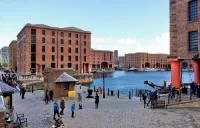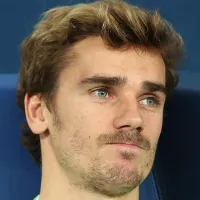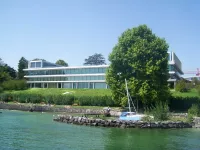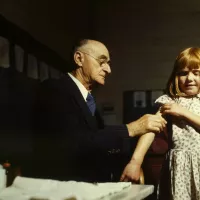April 1903: Club Foundation
In April 1903, Athletic Club Sucursal de Madrid was founded as a branch of Athletic Club (Bilbao).
April 1903: Club Founded by Basque Students
In April 1903, Athletic Club Sucursal de Madrid was founded by three Basque students living in Madrid, who saw the new club as a youth branch of Athletic Bilbao.
1904: Joined by Dissident Members of Real Madrid
In 1904, Athletic Club Sucursal de Madrid was joined by dissident members of Real Madrid.
1909: Kit Acquisition Trip to England
In late 1909, Juan Elorduy went to England to buy Blackburn Rovers' blue and white kits for both Athletic Bilbao and Athletic Madrid, but instead purchased red and white shirts from Southampton.
1910: Adoption of Red and White Stripes
By 1910, both Athletic Bilbao and Madrid were playing in red and white striped shirts. It's believed the change came about as the combination was the cheapest to make.
1911: Copa del Rey Final Win with Borrowed Players
Athletic Bilbao won the 1911 Copa del Rey Final using several 'borrowed' players from Athletic Madrid, including Manolón who scored one of their goals.
1911: Change to red-and-white stripes
In 1911, Atlético Madrid changed to red-and-white stripes, becoming their traditional colors, mirroring then-parent club Athletic Bilbao.
1917: The club's badge was firstly introduced
The club's badge which was firstly introduced in 1917 featuring the Coat of arms of Madrid.
1919: Land Acquisition Near Ciudad Universitaria
In 1919, the Compañía Urbanizadora Metropolitana acquired some land near the Ciudad Universitaria.
1921: Independence and Move to Estadio Metropolitano
In 1921, Athletic Madrid became independent of Athletic Bilbao and moved into the Estadio Metropolitano de Madrid.
1921: Copa del Rey Runners-Up
In 1921, Athletic were Copa del Rey runners-up, facing parent club Athletic Bilbao.
1926: Copa del Rey Runners-Up
In 1926, Athletic were Copa del Rey runners-up, facing parent club Athletic Bilbao.
1928: Invitation to Join La Liga
In 1928, Athletic were invited to join the Primera División of the inaugural La Liga.
1934: Brief Return to La Liga
In 1934, Athletic briefly returned to La Liga but were relegated again.
1936: Relegation and Postponement
In 1936, Athletic were relegated from La Liga, but it was postponed due to the Spanish Civil War.
1937: Foundation of Aviación Nacional
In 1937, Aviación Nacional was founded by three aviation officers of the Spanish Air Force.
November 1939: Victory Secures La Liga Spot
On 26 November 1939, Aviación secured a spot for the 1939-40 La Liga, by winning against Osasuna 3-1.
1939: Merger with Club Aviación Nacional
In 1939, Athletic Club Sucursal de Madrid merged with Club Aviación Nacional.
September 1940: Won Super Cup
In September 1940, Atlético Aviación won the first Super cup in Spanish football after beating RCD Español, the 1940 Copa del Generalísimo winners, in a two-legged game.
1941: Retained La Liga Title
In 1941, Atlético Aviación retained their La Liga title, with Ricardo Zamora as manager.
December 1946: Dropped the military association from its name
On 14 December 1946, the club decided to drop the military association from its name.
1946: Name Change
In 1946, the club was renamed Atlético de Madrid.
1947: Biggest Win over Real Madrid
In 1947, Atlético beat Real Madrid 5–0 at the Metropolitano.
1947: Final season of Germán Gómez
The 1947-48 campaign was the last season of Germán Gómez as player of Atlético Aviación.
1947: The club's badge was incorporated into the club's jersey
The club's badge was incorporated into the club's jersey from 1947.
1950: La Liga Win
In 1950, Atlético won La Liga again, under Helenio Herrera and with the help of Larbi Benbarek.
1951: La Liga Win
In 1951, Atlético won La Liga again, under Helenio Herrera and with the help of Larbi Benbarek.
1953: Departure of Herrera
In 1953, with the departure of Herrera, the club began to slip behind Real Madrid and Barcelona.
1957: Daučík Takes Charge
The 1957–58 season saw Ferdinand Daučík take charge of Atlético.
1958: Second Place in La Liga
In the 1957-1958 season, Ferdinand Daučík led Atlético to second place in La Liga.
1960: Copa del Rey Victory
In 1960, Atlético Madrid, led by José Villalonga, defeated Real Madrid in the Copa del Rey final.
1961: Copa del Rey Victory
In 1961, Atlético Madrid, led by José Villalonga, defeated Real Madrid in the Copa del Rey final.
1961: First European title since the 1961-62 European Cup Winners' Cup
The 2009-10 Europa League title was Atlético Madrid's first European title since the 1961-62 European Cup Winners' Cup.
1962: European Cup Winners' Cup Victory
In 1962, Atlético Madrid won the European Cup Winners' Cup, beating Fiorentina 3–0 after a replay.
1963: European Cup Winners' Cup Final Loss
In 1963, Atlético Madrid reached the European Cup Winners' Cup final, but lost to Tottenham Hotspur 5–1.
1965: La Liga Runners-Up and Victory Against Real Madrid
In 1965, Atlético Madrid finished as La Liga runners-up and became the first team to beat Real Madrid at the Bernabéu in eight years.
October 1966: Inauguration of Vicente Calderón Stadium
On 2 October 1966, Atlético left the Estadio Metropolitano de Madrid and inaugurated the Vicente Calderón Stadium with a fixture against Valencia.
1969: Pichichi Won by José Eulogio Gárate
In 1969, José Eulogio Gárate won the Pichichi.
1970: Pichichi Won by José Eulogio Gárate
In 1970, José Eulogio Gárate won the Pichichi.
1971: Pichichi Won by José Eulogio Gárate
In 1971, José Eulogio Gárate won the Pichichi.
1973: La Liga Win and European Cup Final Qualification
In 1973, Atlético won La Liga and qualified for the 1974 European Cup Final.
1974: European Cup Final Loss and Controversial Fouls
In 1974, Atlético lost the European Cup Final against Bayern Munich after a replay. During the semi-finals against Celtic, Atlético had multiple players sent off for cynical fouling.
1974: Appointment of Luis Aragonés as Coach and Intercontinental Cup Win
In 1974, Luis Aragonés was appointed coach and Atlético won the Intercontinental Cup after Bayern Munich declined to participate.
1974: Atlético faced city rivals Real Madrid in their first Champions League final since 1974
One week later, in May 2014, Atlético faced city rivals Real Madrid in their first Champions League final since 1974, and the first played between two sides from the same city. They took a first-half lead through Godín and led until the third minute of injury time, when Sergio Ramos headed in an equaliser from a corner; the match went to extra time, and Real ultimately won 4–1.
1980: End of First Coaching Spell for Aragonés
In 1980, Luis Aragonés concluded his first spell as coach of Atlético Madrid.
1982: Foundation of Frente Atlético
Frente Atlético, an ultra group of Club Atlético de Madrid, was founded in 1982.
1982: Beginning of Second Coaching Spell for Aragonés
In 1982, Luis Aragonés began his second spell as coach of Atlético Madrid.
1985: Runner-up Finish and Copa del Rey Win
In 1985, during his second spell as coach, Aragonés led the club to a runners-up finish in La Liga and a Copa del Rey win.
1986: European Cup Winners' Cup Final Loss
In 1986, Aragonés guided the club to the European Cup Winners' Cup final, but Atlético lost to Dynamo Kyiv.
1987: Transformation to S.A.D.
After 1987, Jesús Gil oversaw the transformation from sports club to sociedad anónima deportiva (S.A.D.).
1987: Jesús Gil became president of Atlético Madrid
In 1987, Jesús Gil became the president of Atlético Madrid.
1987: End of Second Coaching Spell for Aragonés
In 1987, Luis Aragonés concluded his second spell as coach of Atlético Madrid.
1987: Jesús Gil becomes club president
In 1987, controversial politician and businessman Jesús Gil became the president of Atlético Madrid. He ran the club until his resignation in May 2003.
1991: Atlético wins Copa del Rey trophy
In 1991, Atlético Madrid won the Copa del Rey trophy. Despite heavy spending on players, this was one of only two trophies won during this period, the other being in 1992.
1991: Beginning of Third Coaching Spell for Aragonés
In 1991, Luis Aragonés began his third spell as coach of Atlético Madrid.
1992: Atlético Madrid converted into sports limited company
In 1992, Atlético Madrid converted into a sports limited company due to Spain’s new Sports Law, amidst financial difficulties.
1992: Atlético converted to Sociedad Anónima Deportiva
In 1992, Atlético Madrid underwent a forced conversion from a fan-owned club to a Sociedad Anónima Deportiva. Jesús Gil seized 95% of the shares while failing to effectively pay for them during this conversion.
1992: Atlético wins Copa del Rey trophy
In 1992, Atlético Madrid won their second consecutive Copa del Rey trophy. Despite the spending on players, league titles remained elusive.
1993: End of Third Coaching Spell for Aragonés
In 1993, Luis Aragonés concluded his third spell as coach of Atlético Madrid.
1994: Atlético narrowly avoids relegation
During the 1994 league campaign, Atlético Madrid narrowly avoided relegation by securing a draw on the last day of the season.
1995: Role as pivotal player in their 1995-96 league and cup double
According to Spanish football writer Andy West, Atlético fans came to quickly to embrace Simeone, especially in light of his role as a pivotal player in their 1995-96 league and cup double.
1995: Managerial change and squad clearance
In the summer of 1995, Atlético Madrid underwent a managerial change and a wholesale squad clearance following a season where they narrowly avoided relegation.
1996: La Liga and Copa del Rey Double
In 1996, Atlético Madrid won both the La Liga title and the Copa del Rey, achieving a league and cup double.
1996: Atlético wins La Liga/Copa del Rey double
In the 1995–96 season, Atlético Madrid, coached by Radomir Antić, achieved the La Liga/Copa del Rey double. The squad included players like Toni, Roberto Solozábal, and new signings like Milinko Pantić.
1996: Last UEFA Champions League qualification since 1996-97 season.
The 2007-08 season was the most successful for Atlético Madrid in the past decade, finishing the league in fourth place and qualifying for the UEFA Champions League for the first time since the 1996-97 season.
1997: Atlético participates in UEFA Champions League for first time
In the 1996–97 season, Atlético Madrid took part in the UEFA Champions League for the first time. The club was eliminated by Ajax in extra-time in the quarter-finals.
1998: Arrigo Sacchi replaces Antić as manager
In the summer of 1998, Arrigo Sacchi replaced Radomir Antić as manager of Atlético Madrid. However, Sacchi remained in the position for less than six months.
December 1999: Jesús Gil suspended as club president
In December 1999, Atlético Madrid's president Jesús Gil and his board were suspended pending an investigation into the misuse of club funds. José Manuel Rubí was appointed as government-appointed administrator to run the club's day-to-day operations.
1999: Claudio Ranieri replaces Antić as manager
At the end of the 1998-99 season, Claudio Ranieri replaced Antić as manager of Atlético Madrid.
1999: Gil, Cerezo, and Gil were charged with fraud and embezzlement
In 1999, Jesús Gil, Enrique Cerezo, and Miguel Ángel Gil were charged with fraud and embezzlement regarding the club's ownership.
2000: Atlético relegated to Segunda División and loses Copa del Rey final
In 2000, Atlético Madrid were relegated to the Segunda División for the second time in 66 years. They also reached the Copa del Rey final but lost to Espanyol.
2001: Nike became the kit maker
Since 2001, Atlético Madrid's kit has been made by Nike.
2002: Atlético wins Segunda División championship
In 2002, Atlético Madrid won the Segunda División championship, marking their return to the Primera División. Luis Aragonés was the manager during this period.
2002: Fernando Torres makes La Liga debut
In 2002, Fernando Torres made his La Liga debut for Atlético Madrid. He scored 13 goals in 29 appearances in his first season.
2002: Beginning of Fourth Coaching Spell for Aragonés
In 2002, Luis Aragonés began his fourth spell as coach of Atlético Madrid.
May 2003: Jesús Gil resigns as club president
In May 2003, controversial politician and businessman Jesús Gil resigned as president of Atlético Madrid, after having run the club since 1987. During his tenure, Gil had been involved in a fraud of misappropriation by seizing 95% of the shares while failing to effectively pay for them during the Atlético's forced conversion from fan-owned club to Sociedad Anónima Deportiva in 1992.
July 2003: Chelsea offer for Fernando Torres rejected
In July 2003, Chelsea owner Roman Abramovich offered £28 million for Fernando Torres, but Atlético Madrid rejected the offer.
2003: King Felipe VI Became Honorary President
In 2003, King Felipe VI became the Honorary President of Atlético Madrid.
2003: End of Fourth Coaching Spell for Aragonés
In 2003, Luis Aragonés concluded his fourth spell as coach of Atlético Madrid.
2003: Club sponsored by Columbia Pictures
In its 2003–04 season, the club was sponsored by Columbia Pictures, who would change the shirt sponsor's logo.
2003: Cerezo became club's president
Since 2003, Enrique Cerezo has served as the president of Atlético Madrid, while Miguel Ángel Gil Marín has been the chief executive officer.
2003: Felipe VI became the honorary president of the club
Since 2003, Felipe VI, the king of Spain, has been the honorary president of Atlético Madrid.
2004: Columbia Picture's film White Chicks
In the 2003–04 season, Columbia Picture's 2004 film White Chicks was one of the films featured, and it received mixed commentary.
2005: Nike not included sponsors
Because shirts would have to be introduced and removed from shops at a very fast pace to keep up with film releases, Nike decided to not include a sponsor's logo on replica shirts made from 2003 to 2005.
2006: Atlético signs Costinha, Maniche, and Agüero
In 2006, Atlético Madrid signed Portuguese midfielders Costinha and Maniche, as well as Argentine forward Sergio Agüero.
July 2007: Agreement reached to sell stadium land and move to Olympic Stadium
In July 2007, Atlético Madrid reached an agreement with the City of Madrid to sell the land where their stadium was located and move the club to the City-owned Olympic Stadium.
July 2007: Fernando Torres leaves for Liverpool
In July 2007, Fernando Torres left Atlético Madrid and signed with Liverpool for €38 million. Simultaneously, Luis García signed for Atlético Madrid in an unrelated transfer.
2007: Atlético Madrid started participating in European competition every year
From the 2007–08 season, Atlético Madrid has taken part in either the Champions League or the UEFA Europa League every year.
February 2009: Javier Aguirre dismissed as manager
On 3 February 2009, Javier Aguirre was dismissed from his post as manager after a poor start to the season. Abel Resino was appointed as Atlético's new manager.
October 2009: Abel Resino leaves, Quique Sánchez Flores becomes new manager
In October 2009, after a 4–0 defeat by Chelsea in the Champions League group stage, Abel Resino was replaced by Quique Sánchez Flores as manager of Atlético Madrid.
2009: Atlético Madrid entered the UEFA Super Cup
Atlético Madrid entered the UEFA Super Cup in the 2009-10 season.
2009: Koke Debuts for Atlético Madrid
In 2009, Koke began playing for Atlético Madrid, eventually participating in more than 700 matches for the club.
May 2010: Atlético wins Europa League and loses Copa del Rey final
In May 2010, Atlético Madrid won the Europa League, defeating Fulham 2–1 in the final. Diego Forlán scored twice. They also reached the Copa del Rey final but lost 2–0 to Sevilla.
August 2010: Atlético wins UEFA Super Cup
On 27 August 2010, Atlético Madrid won the UEFA Super Cup, defeating Inter Milan 2–0 with goals from José Antonio Reyes and Agüero.
2010: Disappointing season leads to manager departure
Atlético Madrid had a comparatively disappointing 2010-11 season, finishing only seventh in the League and being eliminated in the quarter-finals of the Copa del Rey and the group stage of the Europa League. This led to the departure of manager Sánchez Flores.
2010: UEFA Europa League and Super Cup Wins
In 2010, Atlético Madrid won the UEFA Europa League and the UEFA Super Cup.
December 2011: Diego Simeone appointed as manager
On 23 December 2011, Atlético Madrid appointed their former Argentine player, Diego Simeone, as manager, replacing Gregorio Manzano.
May 2012: Atlético wins Europa League
On 9 May 2012, Atlético Madrid won the Europa League, defeating Athletic Bilbao 3–0 in the final held at National Arena in Bucharest. Radamel Falcao scored two goals.
August 2012: Atlético wins UEFA Super Cup
On 31 August 2012, Atlético Madrid won the UEFA Super Cup, defeating Chelsea 4–1. Falcao scored a hat-trick in the first half.
2012: Atlético Madrid won the Europa League
Atlético Madrid won the Europa League in the 2012-13 season.
2012: Atlético's shirt sponsorship by Azerbaijan
Between 2012 and 2014, Atlético Madrid's main shirt sponsorship by the government of Azerbaijan, featuring the slogan 'Land of Fire', faced condemnation.
2012: UEFA Europa League and Super Cup Wins
In 2012, Atlético Madrid won the UEFA Europa League and the UEFA Super Cup.
May 2013: Atlético wins Copa del Rey
On 17 May 2013, Atlético Madrid beat Real Madrid 2–1 in the Copa del Rey final, ending a 14-year winless streak in the Madrid derby.
May 2013: Atlético beat Real Madrid in Copa del Rey final
On 17 May 2013, Atlético Madrid ended a 14-year winless streak against Real Madrid by defeating them 2–1 in the 2013 Copa del Rey final at the Santiago Bernabéu.
September 2013: Atlético defeated Real Madrid again
On 29 September 2013, Atlético Madrid continued their winning streak against Real Madrid with a 1–0 victory at the Bernabéu.
July 2014: Antoine Griezmann joined Atlético from Real Sociedad
On 28 July 2014, Antoine Griezmann, after a successful season in La Liga and participation in the 2014 FIFA World Cup, joined Atlético Madrid from Real Sociedad.
August 2014: Helsinki Foundation called on Atlético to end sponsorship by Azerbaijan
In August 2014, the Helsinki Foundation for Human Rights called on Atlético Madrid to end the sponsorship by Azerbaijan due to the country's human rights record.
2014: Atlético Madrid expelled Frente Atlético
In 2014, Atlético Madrid expelled Frente Atlético and prohibited the display of its symbols in the stadium.
2015: Wanda Group purchased stake in Atlético Madrid
In 2015, the Chinese conglomerate Wanda Group purchased a 17% stake in Atlético Madrid.
2016: Stadium land bought by club for €30.4 million
In 2016, Atlético Madrid bought the stadium land for €30.4 million. Previously, Madrid had applied to host the 2016 Olympic Games, but lost out to Rio de Janeiro.
2016: Atlético Madrid lost Champions League final against Real Madrid
In 2016, Atlético Madrid faced Real Madrid in the UEFA Champions League final, losing the match.
2016: Atlético upset Barcelona in Champions League
In 2016, Atlético Madrid upset Barcelona in the Champions League knockout phase.
2016: Atlético lost Champions League final and Griezmann placed third in Ballon d'Or
In 2016, Atlético reached the Champions League final but lost to Real Madrid on penalties after a 1–1 draw. Antoine Griezmann also finished as the top scorer at UEFA Euro 2016, earned the tournament's best player award and placed third in the Ballon d'Or rankings.
2016: Atlético Madrid generated revenue of €272.5 million
In the 2016–17 season, Atlético Madrid generated revenue of €272.5 million, making it the third-highest-grossing football club in Spain and ranked 13th worldwide.
2016: Madrid's failed bid to host the Summer Olympic
The Riyadh Air Metropolitano was expanded from a 20,000 seat capacity to 68,000 after it was used for Madrid's failed bid to host the 2016 Summer Olympic.
2016: The club's badge was remodeled
The club's badge was remodeled in 2016.
May 2017: Atlético's last home game at Vicente Calderón Stadium
On 21 May 2017, Atlético played their last home game at the Vicente Calderón Stadium, marking the transition to their new stadium, the Wanda Metropolitano.
2017: Atlético Madrid won the Europa League
Atlético Madrid won the Europa League in the 2017-18 season.
2017: Atlético ended its partnership with Atlético de Kolkata
In 2017, Atlético Madrid ended its partnership with the Indian Super League franchise Atlético de Kolkata.
2017: Quantum Pacific Group acquired stake in Atlético Madrid
In 2017, Quantum Pacific Group acquired a 15% stake in Atlético Madrid.
October 2018: Atletico De Madrid announced their first academy in Pakistan
In October 2018, Atletico De Madrid announced their first academy in Pakistan, based in Lahore, becoming the first European football academy in Pakistan.
2018: Atlético won Europa League and UEFA Super Cup
In 2018, Atlético Madrid won the Europa League by defeating Marseille 3–0. They also secured the UEFA Super Cup by beating Real Madrid 4–2.
2018: UEFA Europa League and Super Cup Wins
In 2018, Atlético Madrid won the UEFA Europa League and the UEFA Super Cup.
October 2019: Atletico De Madrid conducted talents in Lahore
In October 2019, Atletico De Madrid conducted talents search activities in Lahore.
2019: Antoine Griezmann departed to Barcelona
In 2019, French striker Antoine Griezmann controversially departed Atlético Madrid for Barcelona.
February 2020: Atletico Madrid Lahore included in Football Federation League
In February 2020, Pakistan Football Federation announced the 2020–21 Football Federation League, in which Atletico Madrid Lahore was included in Group C and became a professional Pakistani football club. They won their debut match against Hazara Coal 2–0.
September 2020: Atlético signed Luis Suárez from Barcelona
In September 2020, specifically on the 25th, Atlético Madrid signed Luis Suárez from Barcelona.
2020: Luis Suárez moved to Atlético Madrid
In 2020, Luis Suárez moved to Atlético Madrid, playing a crucial role in the team's championship run.
May 2021: Atlético won La Liga
On 22 May 2021, Atlético Madrid won La Liga, defeating Valladolid 2–1 in the final game of the season at the José Zorrilla Stadium.
2021: Gil Marín, Cerezo, and Ares Management hold shares
After a 2021 capital increase, Miguel Ángel Gil Marín, Enrique Cerezo, and incoming investor Ares Management hold 66.98% of the shares through 'Atlético HoldCo'.
2021: Antoine Griezmann returned to Atlético Madrid
In 2021, Antoine Griezmann returned to Atlético Madrid amidst Barcelona's financial difficulties.
2022: Record of separate film titles
The club's kit sponsorship deal featured 16 separate film titles which still remained as the highest in 2022.
June 2023: Vote to reinstate historical badge
On 30 June 2023, a vote revealed that 88.68% of club members wanted to reinstate the historical badge.
2023: Alternative Kit Origin Investigation
In 2023, an investigation proposed an alternative kit origin location as Sunderland, whose team also wore those colours.
2023: Atlético Madrid ranked 12th in Europe with €409.5 million
In the 2023–24 season, Atlético Madrid ranked 12th in Europe with €409.5 million in revenue.
July 2024: Representation of historical badge
On 1 July 2024, the historical badge would be represented.
January 2025: Atlético Madrid Ranks Among Top Sports Clubs on Instagram
As of January 2025, Atlético Madrid ranked 16th among the top 20 most popular sports clubs on Instagram worldwide, highlighting its large international fanbase.
November 2025: Apollo Sports Capital to acquire controlling stake
In November 2025, it was announced that Apollo Sports Capital would acquire a controlling stake in Atlético Madrid, valuing the club at approximately €2.2 billion. CEO Miguel Ángel Gil and president Enrique Cerezo would remain in their positions.
2026: Finalization of acquisition by Apollo Sports Capital expected
The transaction where Apollo Sports Capital acquires a controlling stake in Atlético Madrid is expected to be finalized in the first quarter of 2026.
Mentioned in this timeline

Instagram is a photo and video-sharing social networking service owned...

Liverpool is a port city and metropolitan borough located in...

Antoine Griezmann is a French professional footballer renowned for his...
Azerbaijan is a transcontinental and landlocked country located in the...
La Liga officially LaLiga EA Sports is the top professional...

Football is a family of team sports primarily involving kicking...
Trending
54 minutes ago Pokemon Celebrates 30 Years: A Cultural Phenomenon with Multimillion-Dollar Cards

54 minutes ago Daylight Saving Time 2026: Prepare to set your clocks forward and lose sleep.

54 minutes ago Indiana Investigates CenterPoint Energy Amid Bill Concerns and New Utility Law.

55 minutes ago Galatasaray's Champions League opponent revealed; Liverpool legend comments on Juventus match; Real Madrid faces Man City.

3 hours ago Google Maps to fully function in South Korea after data agreement.

4 hours ago CDC Panel to Discuss COVID-19 Vaccine Injuries Following RFK Jr.'s Meeting
Popular

Jesse Jackson is an American civil rights activist politician and...

Barack Obama the th U S President - was the...

Susan Rice is an American diplomat and public official prominent...

XXXTentacion born Jahseh Dwayne Ricardo Onfroy was a controversial yet...

Michael Joseph Jackson the King of Pop was a highly...

Kashyap Pramod Patel is an American lawyer who became the...